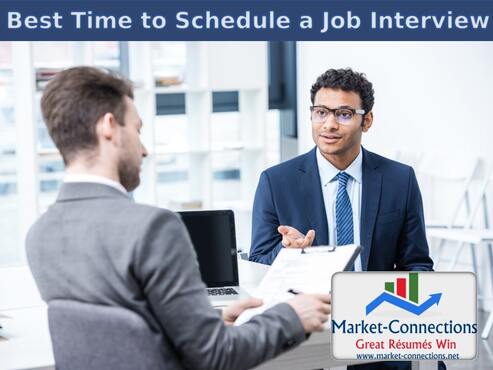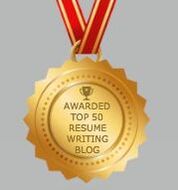Best Time to Schedule a Job InterviewWhen is the best time to schedule your interview? The easy answer is whenever it works for the interviewer! After all, that’s the goal — to get the interview, and then the job offer. But what if you are offered a choice of dates and/or times for the interview? When should you choose? Is it better to be the first person interviewed? Or to be one of the final candidates considered? Should you schedule your interview for the morning? Or the afternoon? And, if you’re offered the option of a virtual interview, or meeting in-person, which should you choose? Here are the pros and cons of being towards the front of the pack, one of the last, or somewhere in the middle. Where Do You Want To Be In the Schedule?Interviewers compare candidates against other candidates — if you are the first, other applicants will be judged against you. This sounds good — but unconsciously, the interviewer is looking for an improvement over you. “Contrast bias” occurs when an interviewer compares candidates against each other. It’s a common effect in the hiring process, as candidates are judged in comparison with one another instead of each candidate being assessed individually on his or her skills and qualifications. This can be a positive if you are a stronger candidate than the other applicants being interviewed, but it can also be a negative as the interviewer may unconsciously be looking to find someone “better” than you, even if you’re the perfect fit. You also don’t want to be the last candidate interviewed — especially if a lot of applicants are being considered. Unless your qualifications are substantially better — or different — than the others being interviewed, it’s harder to stand out. If all the interviews are being conducted on the same day, it’s also likely the interviewer may be tired — conducting multiple interviews in a single day can be draining. A key sign of this is if the interviewer says something like, “Did I already ask you…” — that’s a signal that the applicants are all starting to blend together and that you need to especially make yourself stand out. If possible, you want to be in the early to middle part of the list of candidates interviewed. If you’ve ever watched “America’s Got Talent” or “American Idol,” you’ve seen this principle in action. As the days grind on, the decision-making process gets shorter and shorter as the patience of the judges wears thin. An act that might have advanced if it had been considered earlier sometimes gets a quick “no” on the next-to-last or last day of judging. This is an especially important concept for screening interviews (when the applicant pool is being narrowed down for more in-depth interviews) or in a first-round interview (when second or third interviews will be conducted). The interviewer may have already said “yes” to several other candidates, and may be getting mindful of not wanting to have to interview too many candidates in the next round. If you are told that interviews will be conducted over a period of three days, for example, try to schedule your interview in the middle of the first day, or on the second day. Try not to be at the very front or the very end of the interviews scheduled. What Time of Day is Best?Don’t be the first interview of the morning if you can help it. Your interviewer might be running late if he or she runs into traffic (for an in-person interview) or if the interviewer encounters an unexpected situation when beginning the workday. An early-morning interview could be derailed by family/home issues — if you’ve ever walked out the door to a flat tire in the morning, you get it. You also don’t want to be the last thing on the interviewer’s schedule before they get to leave for the day, or they might be impatient to wrap things up. You don’t want to have a great conversation cut short by, “Sorry, I have to leave here by 5 p.m.” Of course, a premature ending to the interview can also happen when the interviewer has another candidate to see, or another task that needs completed. You can ask when scheduling the interview how long you should block out for the interview. If offered a choice of the time of day, consider your natural preferences too. If you are a morning person, try to schedule your interview between 10-11 a.m. Too close to noon and it is possible that you, the interviewer — or both of you — will be getting hungry. If you’re a night owl, it might be difficult for you to be at your best for a morning interview. In that case, consider an interview time in the mid-afternoon. But don’t select a time that is too close to lunchtime, or you — and the interviewer — might be a bit more tired, especially after a carb-heavy lunch. What Day of the Week is Best?What is the best day of the week to schedule an interview, if you’re given a choice? Tuesday or Wednesday, according to the experts. Mondays can be hectic, especially for interviewers that have hiring responsibility alongside their other normal job functions. Fridays aren’t always a good choice either, as interviewers sometimes mentally “check out” after a busy week. A Friday before a holiday weekend is an especially bad time. And try not to schedule the interview for the day after a holiday — the interviewer may have to catch up on some things that backed up while they were out of the office. In-Person or Virtual Interview?According to HireVue’s 2022 Global Trends Report, 37 percent of more than 1,600 hiring leaders surveyed said they have moved to a combination of both in-person and virtual interviews. Both types of interviews have their pros and cons. If offered the choice, consider these factors:
Questions to Ask When Scheduling the InterviewThere are some questions you can ask before you select your interview time and date. Some of these include:
The Most Important Thing to Consider in Job Interview SchedulingThe most important factor for success in a job interview isn’t the time of day or day of the week -- it’s your qualifications for the role, your preparation for the interview, and the connection you make about your suitability for the position. The ideal situation, of course, is that you interview when there are few distractions, after a couple of weaker candidates, you and the interviewer both have high energy levels, and you are the best applicant in the bunch. But you can only control a few of those factors, so take the best time, date, placement, and format and make the most of it! About the AuthorMandy Fard is a Certified Professional Resume Writer (CPRW, CMRW) and Recruiter with decades of experience in assisting job seekers, working directly with employers in multiple industries, and writing proven-effective resumes. |
Categories
All
powered by Surfing Waves
AuthorMandy Fard is a Certified Professional Resume Writer (CPRW, CMRW) and Recruiter with decades of experience in assisting job seekers, working directly with employers in multiple industries, and writing proven-effective resumes. Archives
July 2024
|
-
Greater Los Angeles
and Kern County
-
[email protected]
.




 RSS Feed
RSS Feed



